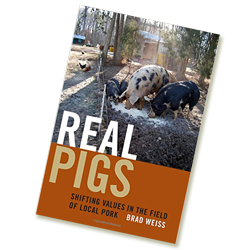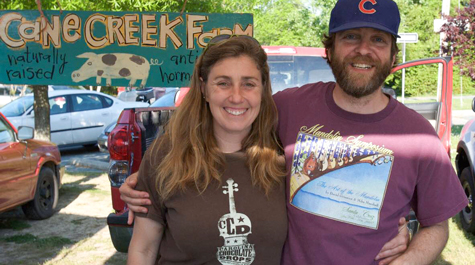手工猪和生产它们的工匠
真猪:地方猪肉领域价值的转移
除了“大猪肉”,还有其他选择,它们不仅是有趣的读物,也是美味的美食。
Brad Weiss is the chair of William & Mary’s 人类学系, a researcher who went out among the people who raise and market heirloom pig stock in North Carolina. 他不仅仅是一个旁观者,他曾在农贸市场销售手工猪肉产品,并亲自饲养这些动物。 His book 真正的猪 (Duke University Press) explores connections between modern fork-to-table consumer attitudes and traditional animal husbandry folkways.
Weiss includes anecdotes and interviews with people in the pig business as well as fascinating transcriptions of conversations during which a pig is “broken down” into marketable parts. In a large sense, 真正的猪 is about esthetics, and Weiss offers a hopeful alternative to foodies and regular old meat eaters alike, folks who are missing something beyond flavor when they sit down to a plate of extra-lean, extra-bland commodity pork: “Thus, the fattiness of pork has the potential to suggest, for example, unctuousness of character, smugness and immoderation, but also humility, sincerity and modesty.”
问:命名法。 You use “pig” as well as “hog” throughout the book, but mostly “pig.” 有什么特别的原因吗?
答:不。 农民们两者都用。 我从来没有注意到其中一种用法比另一种多。 “Pigs” is more common, but “hogs” seemed acceptable. “Pigs” is also what laymen call “piglets,” so there’s the possibility that hogs are much bigger pigs.
Q: Your approach to artisanal pork has been/可以 be applied to any number of “real” foods: eggs, bread, pies, fish, etc. 关于猪肉,有什么东西能让我们对养传家宝猪的人和养传家宝鸡的人进行人种学研究吗?
A: It’s true, a lot of the concerns I address in the book are relevant to a wide array of foods. 但是养猪的物质条件与养鸡有本质上的不同。 首先,你可以为了鸡蛋而养鸡,而不必担心为了肉而养鸡。 养鸡的基础设施当然比养猪简单,如果你决定养几头猪来丰富你的花园(许多农民都这样做),你必须承诺屠宰和销售这些动物。 加工是猪和鸡的主要区别。 在你的农场每年加工和出售大约1000只鸡是合法的(至少在北卡罗来纳州),但你必须在美国农业部批准的设施里屠宰猪。 而且可供小农使用的土地也不多了。 最重要的是,你需要一个处理器把你的猪分解成可出售的部分,然后你需要存储空间来保存它们,还有一个想要购买你的小腿、脚甚至火腿的客户,这可能是一个挑战。 对于鸡,你只需要卖整只鸡。 养猪的人必须比养鸡的人更专注于动物生活,并看到这对农场的影响,以及他们的底线。
Q: The people in 真正的猪 seem to be real professionals, in the broadest sense. 他们感兴趣的是养猪生产中棘手的美学和理论问题,以及大量的实践知识。
 A: That’s so. 围绕农业经济、养猪科学、有机/牧场养殖实践等开展的教育活动如此之多,以至于这是一项既需要智力技能又需要体力劳动的活动。
A: That’s so. 围绕农业经济、养猪科学、有机/牧场养殖实践等开展的教育活动如此之多,以至于这是一项既需要智力技能又需要体力劳动的活动。
Q: This “real pig” movement has been a thing in the Piedmont for less than 20 years. It seems to be driven as much by the supplier’s aesthetics to raise animals in an interesting way as it is the desire for a good, authentic, flavorful pork chop.
答:的确,生产者对以独特的方式对待动物很感兴趣,消费者也在寻找美味的蛋白质。 But it’s also true that consumers — in lots of places — are taking a strong interest in husbandry practices and in animal welfare, and a lot of farmers are studying tastes and cooking techniques to engage in customer outreach. One thing I find is that direct marketing (farmer’s markets, or producer sales online) make these two concerns much more directly connected than is the case for industrial processes. 在北卡罗来纳州的皮埃蒙特,有很多见多识广的消费者,他们在科技、医药和教育领域从事着相对高薪的工作。 这些人在寻找替代品,这个社区在农业方面也有很多经验,他们正在努力改变生产方式。
问:牧场饲养的猪肉是可持续的吗? 我的意思是经济上可持续。 If you were to remove the incentives, grants and what your sources call “public jobs,” can a person make a go of a real piggery?
答:目前,答案是否定的。 If farming is the sole source of your income, and you are committed to local markets, and you do not farm on family land, it is 真的 hard to make a go of it. Even the relatively abstract models of how such farming 可以 be economically successful assume that farmers have supplementary sources of income. I’m not sure this is unique to pigs, though. Most of the small-scale farmers of 任何东西 I know, even the ones who have been at it for a number of years and feel that they are “successful” by whatever measures you’d apply, depend on off-farm income.
问:所有动物都是个体,但猪似乎比其他食用动物更有个性。 你之前提到你的农民必须考虑到个体猪的习性。 How much does the pig personality factor drive the farmer’s interest in raising pasture pigs?
A:这完全取决于农民。 Some farmers 真的 didn’t have any feelings at all about individual pigs. 猪在那里的工作是吃花园的残羹剩饭,翻土和赚钱。 But certainly a lot of farmers do feel they need to pay attention to the interests of the animals they work with, to “think like a pig” as I often heard, and try to accommodate these interests to improve their husbandry. 我认识的大多数农民都喜欢猪,喜欢各种山羊、绵羊和鸭子等。 有个性的猪是真正的繁殖者,母猪和公猪会一直待到它们的繁殖期结束。 那些为了上市而饲养的猪往往不会多愁善感,甚至连名字都不会起。
Q: The Ossabaw Island Hog’s story is very interesting. It seems that the original Georgia stock developed its characteristics in isolation, producing qualities that from the farmer’s point of view are both desirable (fattiness, flavor, ability to thrive) and undesirable (propensity for diabetes, etc.) I am unclear about whether these properties developed after stranding or were they were part of the breed’s characteristics all along.
答:这些绝对是适应奥沙巴岛环境的特点。 At the same time, many folks claim that Spanish Pata Negra pigs make the best hams and have a wonderful fat profile, and it’s possible that the Ossabaws are predisposed to those attributes. But there 真的 were no such things as Spanish “breeds” as such when the Ossabaw were abandoned in the 16th century. 所以我认为,这些特征主要是在资源贫乏的环境下,这种小型猪群的杂交繁殖中得到的。



